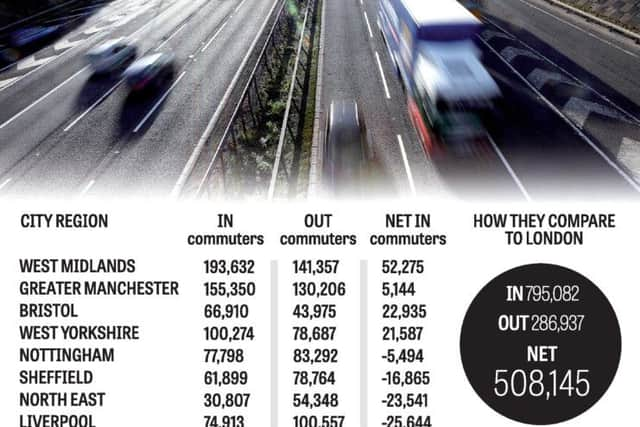More calls for devolution as northern city regions lag behind London


The ONS findings have led to renewed calls for greater devolution of powers from Whitehall to city regions to help rebalance the UK economy away from London and the South East.
The official report highlights alarming gaps in labour productivity and skills between the West Yorkshire and Sheffield city regions and the capital.
Advertisement
Hide AdAdvertisement
Hide AdThe average worker in West Yorkshire creates 11 per cent less value than his national counterpart; the difference is 16 per cent in Sheffield.


The ONS said this is likely due to a relatively low share of residents with degree-level qualifications.
This reflects the challenge facing Yorkshire in retaining university graduates who tend to move to London and the South East to develop their careers.
The ONS report also reveals a stark disparity in household incomes per head in the seven city regions across the North and Midlands, which are 15-22 per cent below the English average.
Advertisement
Hide AdAdvertisement
Hide AdChris Hearld, northern chairman of accountancy firm KPMG, said the figures are “sobering” and show the scale of the work needed to create a Northern Powerhouse.
Alexandra Jones, chief executive of Centre for Cities think tank, said: “In a climate of continued austerity, major cities like Leeds and Sheffield should be playing a big role in boosting the national economy, but these figures show that they are punching below their weight in terms of creating jobs and productivity.
“One big problem is that cities currently don’t have the powers or resources they need to strengthen their economies, such as control over investment in transport, housing and skills.
“The Chancellor George Osborne recently announced that progress is being made in giving West Yorkshire and South Yorkshire more devolved powers, which is a welcome sign, and will hopefully be confirmed before the Government’s spending review in the autumn.
Advertisement
Hide AdAdvertisement
Hide Ad“However, those plans don’t include giving cities more control over taxes, which would offer cities like Leeds and Sheffield the incentives they need to grow their economies. It would also help the Government boost the national finances, and should be an important consideration for the Chancellor, in both tackling the deficit and moving forward with his devolution agenda.”
Ed Cox, director at IPPR North, said: “Outside of London, the UK’s cities are falling short of their significant potential. Public and private investment have tended to concentrate in the capital, and skilled labour has followed. This needs to change for the country as a whole to prosper.
“But our under-performing cities and our over-centralised politics are related – the step change that’s needed can’t be managed from Whitehall. Evidence from other countries suggests that devolving powers to city-regions would help fulfil their potential.”
On the positive side, four of the city regions - Bristol, Greater Manchester, West Yorkshire, and West Midlands - had net in-commuting flows, seen as a good indicator of economic strength and importance to the wider economy.
Advertisement
Hide AdAdvertisement
Hide AdThomas Forth, associate at the Leeds Open Data Institute, said city regions need powers to regulate buses, improved rail connections and directly elected mayors to provide a strong voice for change.
He told The Yorkshire Post: “The ONS report, together with recent data from Centre for Cities on regional tax and spend, gives us our clearest picture yet of the incredible potential of the North’s cities and how far we are from realising it.
“With Bristol falling below the English average in productivity (GVA per hour worked) it is no longer the exception; every English city now has lower productivity than the English average. Scottish cities do noticeably better.
“The commuter flow numbers are a reminder that people in South Yorkshire are commuting to West Yorkshire and that people in Liverpool are commuting to Manchester. Our politics needs to catch up with what our people are already doing.
Advertisement
Hide AdAdvertisement
Hide Ad“Facilitating flows of people to better and more productive jobs will help the North to grow its economy. On the ground that means better jobs for more people and less reliance on money from elsewhere to pay our way.”